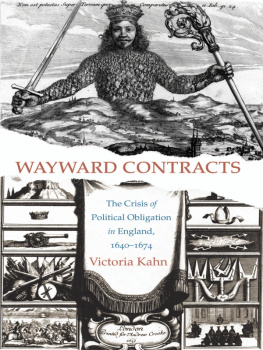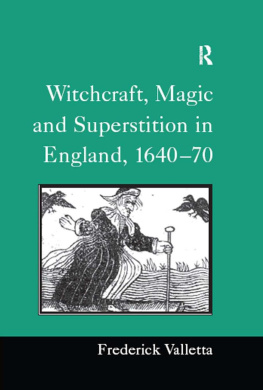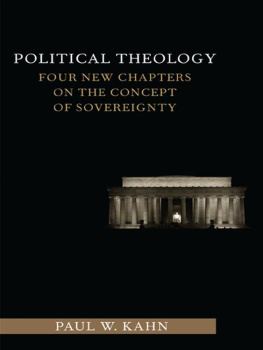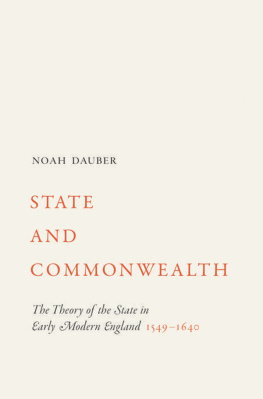Kahn - Wayward contracts: the crisis of political obligation in England, 1640-1674
Here you can read online Kahn - Wayward contracts: the crisis of political obligation in England, 1640-1674 full text of the book (entire story) in english for free. Download pdf and epub, get meaning, cover and reviews about this ebook. City: Princeton, year: 2016;2009, publisher: Princeton University Press, genre: Politics. Description of the work, (preface) as well as reviews are available. Best literature library LitArk.com created for fans of good reading and offers a wide selection of genres:
Romance novel
Science fiction
Adventure
Detective
Science
History
Home and family
Prose
Art
Politics
Computer
Non-fiction
Religion
Business
Children
Humor
Choose a favorite category and find really read worthwhile books. Enjoy immersion in the world of imagination, feel the emotions of the characters or learn something new for yourself, make an fascinating discovery.
- Book:Wayward contracts: the crisis of political obligation in England, 1640-1674
- Author:
- Publisher:Princeton University Press
- Genre:
- Year:2016;2009
- City:Princeton
- Rating:5 / 5
- Favourites:Add to favourites
- Your mark:
- 100
- 1
- 2
- 3
- 4
- 5
Wayward contracts: the crisis of political obligation in England, 1640-1674: summary, description and annotation
We offer to read an annotation, description, summary or preface (depends on what the author of the book "Wayward contracts: the crisis of political obligation in England, 1640-1674" wrote himself). If you haven't found the necessary information about the book — write in the comments, we will try to find it.
Kahn: author's other books
Who wrote Wayward contracts: the crisis of political obligation in England, 1640-1674? Find out the surname, the name of the author of the book and a list of all author's works by series.
Wayward contracts: the crisis of political obligation in England, 1640-1674 — read online for free the complete book (whole text) full work
Below is the text of the book, divided by pages. System saving the place of the last page read, allows you to conveniently read the book "Wayward contracts: the crisis of political obligation in England, 1640-1674" online for free, without having to search again every time where you left off. Put a bookmark, and you can go to the page where you finished reading at any time.
Font size:
Interval:
Bookmark:
Wayward Contracts
Wayward Contracts
THE CRISIS OF POLITICAL OBLIGATION IN ENGLAND, 16401674
Victoria Kahn
PRINCETON UNIVERSITY PRESS PRINCETON AND OXFORD
Copyright 2004 by Princeton University Press
Published by Princeton University Press, 41 William Street,
Princeton, New Jersey 08540
In the United Kingdom: Princeton University Press,
3 Market Place, Woodstock, Oxfordshire OX20 1SY
All Rights Reserved.
Library of Congress Cataloging-in-Publication Data
Kahn, Victoria Ann.
Wayward contracts : the crisis of political obligation in England, 16401674 / Victoria Kahn.
p. cm.
Includes bibliographical references and index.
eISBN: 978-1-40082-642-1
1. English literatureEarly modern, 15001700History and criticism.
2. Politics and literatureGreat BritainHistory17th century. 3. Great BritainPolitics and government16421660. 4. Great BritainPolitics and government16601688. 5. ContractsGreat BritainHistory17th century. 6. Political obligationHistory17th century. 7. Social contractHistory17th century. 8. Contracts in literature. I. Title.
PR438.P65K34 2004
820.9358094109033dc22 2004042850
British Library Cataloging-in-Publication Data is available.
This book has been composed in Sabon
Printed on acid-free paper.
pup.princeton.edu
Printed in the United States of America
10 9 8 7 6 5 4 3 2 1
For Helene
You sense that something is not right. If matters were otherwise, then you would have a sense of well-being. Or you cannot make another persons circumstances right.
Ernst Bloch, Natural Law and Human Dignity
As empirically constructed and produced objects, works of art, even literary ones, point to a practice from which they abstain: the creation of a just life.
Theodor Adorno, Commitment
There is an element of the world-building capacity of man in the human faculty of making and keeping promises.
Hannah Arendt, On Revolution
Contents
Acknowledgments
THIS BOOK IS THE PRODUCT of a happy period at the University of California at Berkeley and at Irvine. I want to thank my colleagues at both campuses for the lively intellectual environment that was crucial to the completion of the book. At Berkeley, I am particularly grateful to David Bates, Lorna Hutson, and Nancy Ruttenburg for their lunchtime conversation, advice, and commentary on the early chapters of the manuscript. Louise George Clubb first invited me to visit Berkeley in 1996 and I have benefited from her generosity ever since. Thanks are due to Carol Clover for suggesting the title of this book and for her passing comment that voluntary servitude seemed like a good thing to write about. At Irvine, I owe a special debt to Brook Thomas for reading early drafts of some of my thoughts on Hobbes and natural rights, for timely bibliographical suggestions, and for his exemplary collegiality. Also at Irvine, Jane Newman and Patrick Sinclair were delightful midweek companions.
It seems appropriate for a book on contract theory that I should have discovered a community of readers in the process of writing it. Constance Jordan, Catherine Gimelli Martin, Jason Rosenblatt, and Nancy Struever read a large chunk of the manuscript and gave me encouraging responses when I most needed them. Catherine Martin and David Bates heroically read the same chapters several times and offered invaluable advice. For their comments on individual chapters or parts thereof, I want to thank Marshall Grossman, Jeffrey Knapp, A. A. Long, Lois Potter, J. P. Sommerville, Tracy Strong, and David Quint. I was very fortunate in my readers for the press, Don Herzog and Steven Zwicker, whose engagement and astute criticism helped to sharpen my argument. Mary Murrell was a loyal and supportive editor, and Brian MacDonald was a scrupulous copyeditor. In the process of writing this book, I have had many occasions to be grateful to Liz Huyck, my research assistant at Princeton many years ago, who is personally responsible for my large xerox library of obscure seventeenth-century texts. At Berkeley, Robyn Marasco was a splendid research assistant on some last-minute tasks. The project received financial support in the form of a grant from the NEH, as well as a UC Presidents Fellowship, and a UC Berkeley Humanities Research Grant. I am grateful to Constance Jordan, Kathy Eden, and David Quint, for their letters of recommendation. Marsha Silverberg was the Gracious Guardian of the East Coast Diskettes. As always, Nancy Troy was an inspiring example and a supportive friend, as was my sister Lisa Davenport, whose regular telephone salutation was Are you working?
The subject matter of this book has followed the career of Helene Silverberg who, in the course of its writing, moved from Political Science to the Law. This book, and life in general, are better in every way because of her.
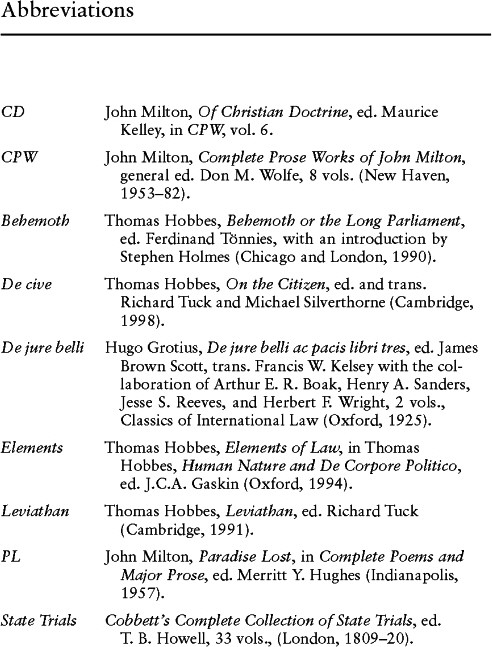
All works of Cicero and Seneca are quoted from the Loeb Classical Library, published by Harvard University Press.
CHAP T E R 1
Introduction
To breed an animal with the right to make promisesis not this the paradoxical problem nature has set itself with regard to man? and is it not the real problem of man?
Nietzsche, The Genealogy of Morals
A worthy person of our age was accustomed to say, that contracts in writing were invented only to bind villains, who having no law, justice, or truth, within themselves, would not keep their words, unless such testimonies were given as might compell them.
Algernon Sidney, Discourses concerning Government
THE SEVENTEENTH CENTURY is the period in which scholars have located the emergence of a distinctively modern conception of political obligation. From Maine and Weber through Macpherson and Walzer, they have recorded the shift from a world of status to one of contractfrom a world, that is, of hierarchical feudal relations to one made up of autonomous individuals who rationally consent to their self-imposed government. In contrast to the medieval pact of subjection, in which a corporate body of the people subjects itself to the sovereign, the new discourse of obligation yielded a protoliberal subject who freely enters into a social and political contract. It is the aim of this book to reconstruct the discourse of contract in the making and, in doing so, to revise this story of political obligation. Specifically I show that seventeenth-century contract theory was defined by a struggle over the role of language and representation, and of the passions and interests, in binding and releasing the political subject. Instead of presupposing a rational and autonomous individual who consents to the political contract, seventeenth-century contract theorists were compelled to create a new political subject ex nihilo. Rather than assuming that government was natural and only needed to be legitimated by consent, early modern writers argued that the state was an artifact that was brought into being by a powerful, if sometimes fictional, speech act. For these reasons, I argue, early modern contract theory is best thought of as a radically new poetics of the subject and the state, one that was manifest across a wide range of texts and genres in mid-seventeenth-century England.
In revising the usual accounts of contract theory, I take a cue from Nietzsches skeptical remarks in The Genealogy of Morals. I assume, he commented acerbically, we have got over that sentimentalism that would have [the state] begin with a contract. According to Nietzsche, the emergence of the contracting subject coincided with the development of Judeo-Christian notions of conscience, subjectivity, and ethical responsibility. Contract theory was implicated in the ongoing battle between Rome and Israel, between the warrior ethos and the slave mentality, which involved the sublimation of the warriors aggression into the new faculty of conscience. This battle was replayed in the Renaissance between Machiavelli on the one hand and Luther and Calvin on the other. Against this mystified discourse of conscience and contract, Nietzsche counterposed a demystified discourse of power. In Nietzsches alternative account, which sounds not coincidentally like Burckhardt in
Next pageFont size:
Interval:
Bookmark:
Similar books «Wayward contracts: the crisis of political obligation in England, 1640-1674»
Look at similar books to Wayward contracts: the crisis of political obligation in England, 1640-1674. We have selected literature similar in name and meaning in the hope of providing readers with more options to find new, interesting, not yet read works.
Discussion, reviews of the book Wayward contracts: the crisis of political obligation in England, 1640-1674 and just readers' own opinions. Leave your comments, write what you think about the work, its meaning or the main characters. Specify what exactly you liked and what you didn't like, and why you think so.

